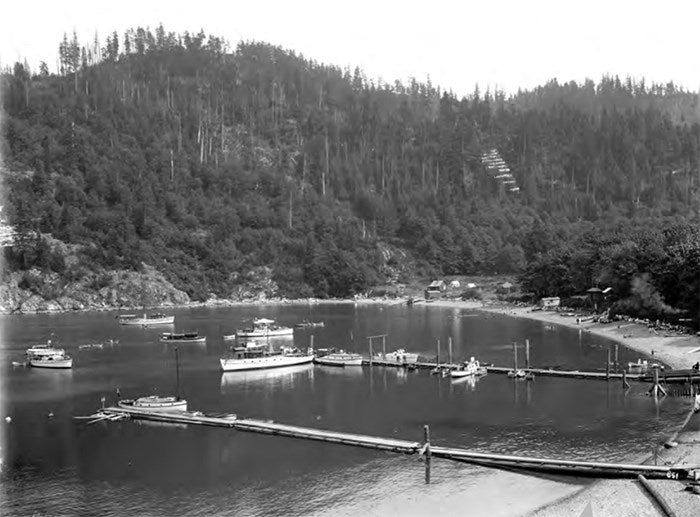Snowy peaks that pierce the clouds. Glimmering blue sea and rushing green rivers. Lush, towering trees. One might imagine a mad deity, after creating this corridor, surveying his handiwork and commanding - “Steeper! Deeper! Faster! Higher!” Howe Sound Sound is a deep, U-shaped fiord carved into the Coast Mountains by glaciers. And the Sea to Sky Highway is the moniker for the roadway that follows the eastern slope of Howe Sound. The route hugs the base of the Coast Mountains, and winds through some of the most stunningly amazing scenery you'll find anywhere on the planet!

Road to Whistler by Sam Siegel.
Photo-ops abound in every direction. For example, there's the amazing Stawamus Chief, a huge granite-scoured monolith and rock-climbing mecca. There's the glorious 'Shannon Falls', an awe-inspiring 335-metre high waterfall, practically just a stone's throw from the highway. Or the glacier-topped Tantalus Range, and the swift rapids of Cheakamus Canyon. Not to mention, the 2,678-metre Mount Garibaldi, and the volcanic rock mountain known as 'Black Tusk'.
Notwithstanding it's shear beauty, The Sea To Sky Highway has had its share of tragedy. Along with the numerous fatal automobile accidents, there have been rockslides and floods that have thundered down on the highway, taking out bridges and buildings.
The Early Days

Rainbow Lodge and surrounding developments, 1930s.
In the late 1800s, early settlers traveled the route then known as the Pemberton Trail, from Burrard Inlet to Pemberton, BC. They had intended, originally, for it to be used for transporting cattle herds. It took years to complete, but in the end, it proved to be too tough for the animals to maneuver.
Until as late as 1956, the population relied on steamships and rail routes to travel north. Then the Pacific Great Eastern Railway line was finally extended from North Vancouver to Squamish. Two years later, the Squamish Highway was completed. Finally, communities on the 100-kilometre stretch from Horseshoe Bay to Whistler were linked to the rest of BC.
Horseshoe Bay

Horseshoe Bay 1920.
This community of roughly 1,000 inhabitants is the starting point, as you travel north along the Sea to Sky Highway to Lions Bay, Squamish, Whistler, and Pemberton. This quaint little village was a holiday destination in the early 1900s. Nowadays, it's known primarily as a BC Ferries terminal point.
Since 1951, when American-owned Black Ball Ferries won the right to start the first ferry route, Horseshoe Bay has played host to long lines of ferry traffic. In 1961, in an effort to maintain a more reliable schedule, the province bought the Black Ball fleet. Now, BC Ferries provides service to Nanaimo, Bowen Island, Gibsons, and other Sunshine Coast communities.
Porteau Cove

Anvil Island by Sam Siegel. (Near Porteau Cove)
Porteau Cove was first developed in 1908, when John F. Deeks set up a sand and gravel company to supply Vancouver construction. Today, the settlement long gone, Porteau Cove is a popular 'diver’s paradise'. boat wrecks and artificial reefs support more than 100 species of marine life, including octopuses, plumose anemones, and lingcod.
Nearby Porteau Cove Provincial Park is popular as a picnic spot, campsite, and scenic dog walking venue. When the weather is favorable, the park’s waterfront campsites fill up quickly.
Britannia Beach

Britannia Beach by Sam Siegel.
A little further north, the town of Britannia Beach was born in the early 1900s, after a hunter chanced upon a seam of copper at Britannia Mountain. By 1929, Britannia Beach had become the largest producer of copper in the British Commonwealth. In 1926, residents even launched an annual pageant to crown a local Copper Queen.
Before completion of the rail line and highway in 1951, the community was largely inaccessible, except by boat. Traveling by steamship, most Britannia Beach residents made the trip to Vancouver only once or twice in a year. The Britannia Mining and Smelting Company store provided for all of their needs, from bootlaces to grand pianos. Nowadays, it's less than a half-hour's drive by car. The mine itself has been closed since 1974, and is, today, the home of the BC Museum of Mining.
Cheakamus River and Lake

Shimmering Waters by Sam Siegel. (Inspired by the Cheakamus River)
North of Squamish, the Cheakamus River runs through the 1,950-square-kilometre Garibaldi Provincial Park. It is named after the Squamish First Nation word for 'salmon weir place'.
There's a cathedral-like grove of trees just beyond the first campsite area of the park. For many visitors, this sight may be the crowning glory their journey. For the scale of the forest at Cheakamus is imposing,” writes Jack Christie in The Whistler Book: An All-Season Outdoor Guide. “There is a hush here found only at exalted elevations.”
Squamish Lil’wat Cultural Centre

The Lil’wat and the Squamish tribes are two First Nations Peoples that inhabit this Sea to Sky route. The Squamish Lil’wat Cultural Centre, bears the motto “where rivers, mountains, and people meet.” “When I am holding a drum and dancing our Lil’wat songs, I am me,” reads a quote from Marie Joe of the Lil’wat Nation in one of the exhibits at the cultural centre.
Whistler - the Gem of the Sea to Sky

Whistler Museum and Archives Society.
Set between Whistler and Blackcomb mountains, Whistler Village owes its name to the distinctive whistle of the hoary marmot—a suitably whimsical story for a place known for fun and recreation. In 1966, the same year the road to the town was finally blacktopped, Whistler Mountain opened for skiing. Back then, it was sparsely developed, and just a day-lodge. But in 1980, a second ski hill, Blackcomb Peak, was developed, soon followed by Whistler Village. With the availability of hotels, ski lodges and restaurants Whistler’s popularity exploded. Today, Whistler Village is rated as the best ski destination in North America.
We are so lucky to be surrounded by such beauty and I attempt to bring that beauty to you via my paintings.
